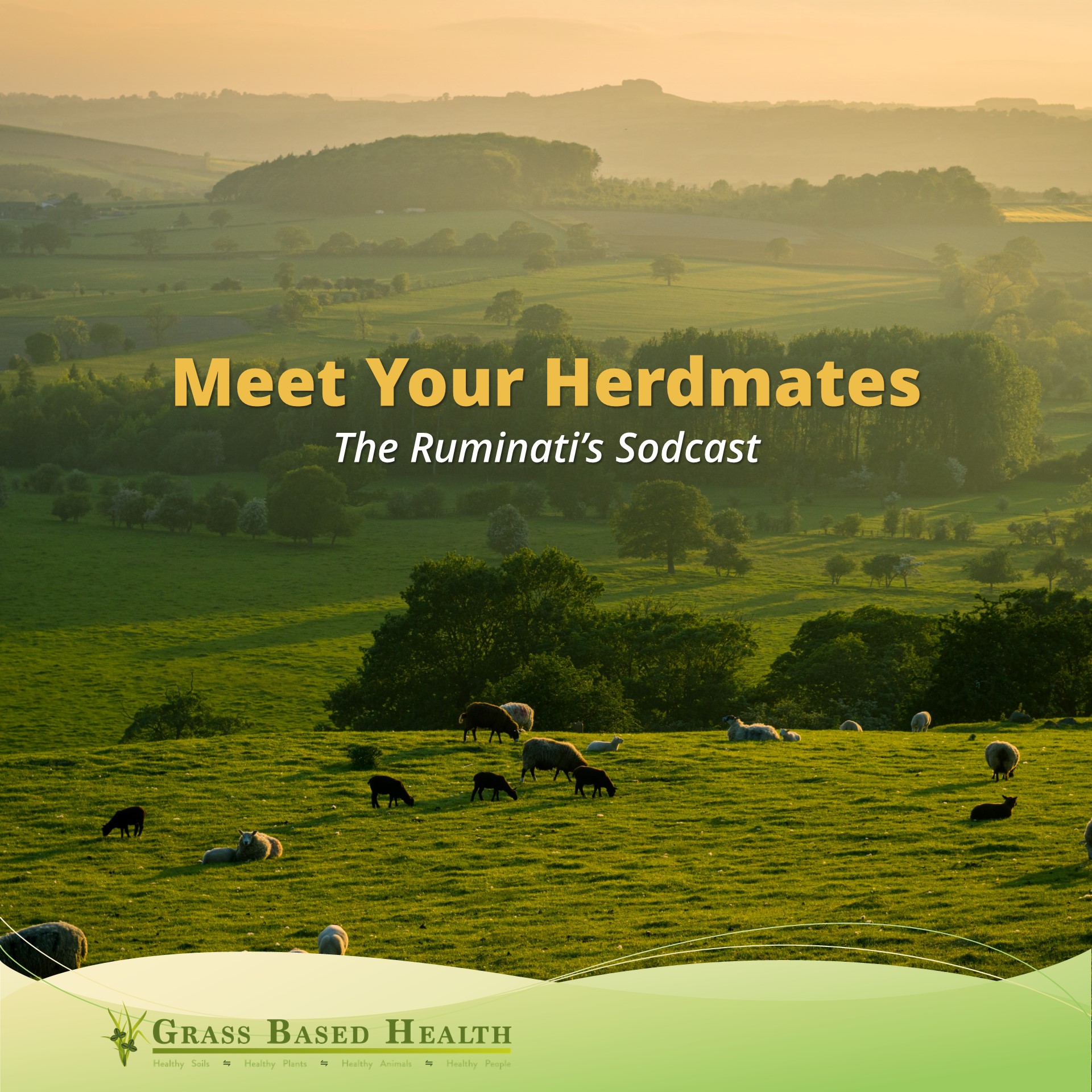
29.9K
Downloads
69
Episodes
There are many people who know something about ruminant animal agriculture and the essential role it plays in meeting the needs of today’s world and the world of 2050. Their expertise may be in some aspect of soil, plant, animal or human health. Or it may be in topics related to environmental stewardship, public policy, or sustainable development. The Ruminati is my attempt to assemble them and introduce them to each other. The goal of this sodcast (see what I did there?) is to make their information more widely known. Welcome to the herd!
Episodes
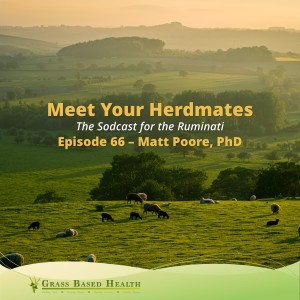
Tuesday Dec 21, 2021
66 Matt Poore, PhD
Tuesday Dec 21, 2021
Tuesday Dec 21, 2021
Matt's a farmer with a day job at North Carolina State University - https://www.ces.ncsu.edu/profile/matt-poore/
Amazing Grazing: Pasture-Based Livestock Education Program - https://cefs.ncsu.edu/extension-and-outreach/amazing-grazing/
The Alliance for Grassland Renewal - https://grasslandrenewal.org/ and its newsletter, “Novel Notes” https://grasslandrenewal.org/novel-notes/
Herdmates episodes: Garry Lacefield - https://youtu.be/Nbz19EKgn8Q; Joe Bouton - https://youtu.be/MztSpMXEHrQ
NC State Local Grass-Fed Beef Production Guidelines https://cefs.ncsu.edu/resources/nc-state-local-grass-fed-beef-production-guidelines-2016/
Books (Amazon links) -
Man, Cattle and Veld by Johann Zietsman https://www.amazon.com/dp/0990467813/ref=cm_sw_em_r_mt_dp_N080B2WSYZGNG0ZNES5J
Dirt to Soil: One Family’s Journey into Regenerative Agriculture
by Gabe Brown https://www.amazon.com/dp/1603587632/ref=cm_sw_em_r_mt_dp_YPZ6R8VWMKS5YY776S3N
Capturing Sunlight: Skills & Ideas for Intensive Grazing, Sustainable Pastures, Healthy Soils, & Grassfed Livestock by Woody Lane https://www.amazon.com/dp/0983323828/ref=cm_sw_em_r_mt_dp_SDV2ZXWG6QKFXK59VEN2
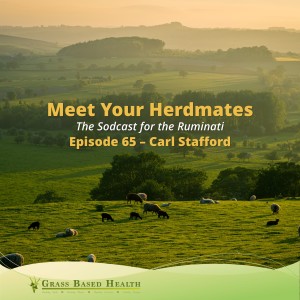
Tuesday Jul 13, 2021
65 Carl Stafford
Tuesday Jul 13, 2021
Tuesday Jul 13, 2021
Carl Stafford is a forage and grazing management champion. A witness to the changes in agriculture.
Carl is a Senior Extension Agent serving Culpeper County, Virginia in Agriculture and Natural Resources, Virginia Cooperative Extension, Virginia Tech. He's served forage agriculture across the US.
https://culpeper.ext.vt.edu/staff/stafford-carl.html
Virginia Forage and Grassland Council - https://vaforages.org/
Graze 300 VA - https://ext.vt.edu/agriculture/graze-300.html
American Forage and Grassland Council - https://www.afgc.org
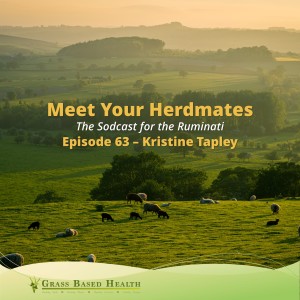
Tuesday Jun 29, 2021
64 Ben Campbell
Tuesday Jun 29, 2021
Tuesday Jun 29, 2021
Ben Campbell is a: Third- & first-generation rancher; Recovering engineer; Conservationist; and Environmental advocate.
He's one of the guardians of the grasslands.
"Since 1970, 84% of grassland species have been lost."
"If you borrow something, you return it in better condition"
Grazed Right - https://grazedright.com/
"Guardians of the Grasslands" - https://guardiansofthegrasslands.ca/
"Guardians of the Grasslands" Launch Event - https://youtu.be/kbaHn4wPt5Y
Lost Rivers Grazing Academy - https://www.uidaho.edu/cals/beef/lost-rivers-grazing
Jim Gerrish & American Grazinglands Services LLC - https://www.americangrazinglands.com/
Ranching for Profit School - https://ranchmanagement.com/ranching-for-profit-school-2/
Soil Health Academy - https://soilhealthacademy.org/
Cattlemen's Young Leaders - https://cattlemensyoungleaders.com/
Waldron Ranch - http://waldronranch.com/history.html & an article from Canadian Cattlemen - https://www.canadiancattlemen.ca/features/historic-ranch-provides-top-grazing-opportunities-for-cattle/
Engineers Without Borders Canada - https://www.ewb.ca/en/
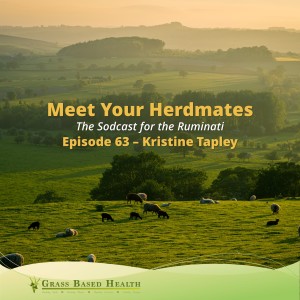
Tuesday Jun 22, 2021
63 Kristine Tapley
Tuesday Jun 22, 2021
Tuesday Jun 22, 2021
"Since the '70s we've lost 87% of prairie obligates."
We've lost four football fields-worth of grassland lost per minute (from 2014-2018).
Kristine Tapley, Regional Agrologist, Ducks Unlimited Canada, Owner Operator Cow-Calf Operation, Old Shore Cattle Company, Langruth, Manitoba.
“The thriving beef industry that can compete on that landscape will keep wetlands and grass on the landscape. We also see that this message and that relationship between conservation and cattle that we think is so integral is only missed by the public.”
"Beef Symposium - Kristine Tapley - Building Resiliency as a Young Beef Farmer: Our Plan So Far" - https://youtu.be/J3KaNC6dwAs
"Guardians of the Grasslands" - https://guardiansofthegrasslands.ca/
Ducks Unlimited Canada - https://www.ducks.ca/
Ducks Unlimited - https://www.ducks.org/
Canadian Roundtable for Sustainable Beef (CRSB) Certification - https://www.crsbcertified.ca/
International Year of Rangeland and Pastoralists - https://iyrp.info/
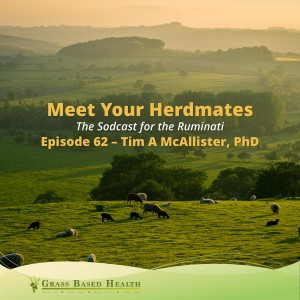
Tuesday Jun 15, 2021
62 Tim McAllister, PhD
Tuesday Jun 15, 2021
Tuesday Jun 15, 2021
The wonder of the essential ruminant, the treasure of our grasslands.
Dr. Tim McAllister grew up on his parents’ cow/calf farm in Innisfail, Alberta. He obtained a B.Sc. (Agr) and M.Sc. from the University of Alberta in Edmonton, and a Ph.D. in ruminant nutrition and microbiology from the University of Guelph, ON. He accepted an NSERC post-doctoral fellowship at the University of Calgary in 1991 and joined Agriculture and Agri-Food Canada in Lethbridge, AB in 1992. Dr. McAllister has been a research scientist in Rumen Microbiology, Feed and Nutrition since 1997. His research focuses on microbiology, nutrition and beef production and on food and environmental safety issues related to livestock production. Dr. McAllister has been recognized internationally for his leadership role and significant contributions to agricultural research and innovation in the areas of ruminant nutrition/microbiology and molecular biology as they apply to animal health, environmental health and food quality for the benefit of the agricultural industry in Alberta, Canada, and beyond.
Dr. McAllister's profile page - https://profils-profiles.science.gc.ca/en/profile/tim-mcallister-ph-d
Dr. McAllister's Google Scholar page - https://scholar.google.com/citations?user=PQ9tLbUAAAAJ&hl=en
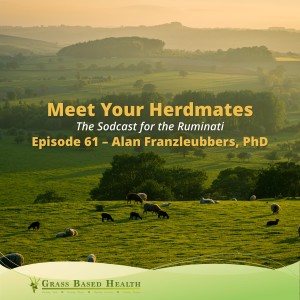
Tuesday Jun 08, 2021
61 Alan Franzluebbers, PhD
Tuesday Jun 08, 2021
Tuesday Jun 08, 2021
Organic matter, soil health, soil biology, and soil ecology - the foundation!
Alan Franzluebbers is a Research Ecologist with the USDA-Agricultural Research Service on the campus of North Carolina State University in Raleigh NC. He has more than 30 years of research experience starting with a master’s program in Nebraska, PhD in Texas, post-doctoral position in Alberta Canada, and as a full-time soil scientist in Georgia and now in North Carolina. Research is being conducted on soil ecology and management for development of more sustainable agricultural systems. Soil health methodologies and soil organic carbon sequestration are tools often used to interpret the effects of management on soil resources. Recent areas of research are in multi-species cover cropping, agroforestry, integrated crop-livestock systems, nitrogen management, and conservation-tillage cropping. Alan is a Fellow of the Soil and Water Conservation Society, Soil Science Society of America, and American Society of Agronomy. He currently serves on the Board of Directors for the American Forage and Grassland Council, and recently served on the Board of Directors for the Soil Science Society of America.
"Know Soil Know Life" - https://www.soils4teachers.org/know-soil-know-life/
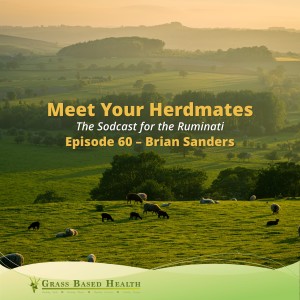
Tuesday Jun 01, 2021
60 Brian Sanders
Tuesday Jun 01, 2021
Tuesday Jun 01, 2021
Documentary filmmaker, podcaster, health coach, businessman.
He graduated from UCLA with a degree in Mechanical Engineering and then turned to technology and sold an app company. He’s used his technical background and love for fitness & nutrition to also work as a Health Coach and be the co-founder of the health, media, and technology company SAPIEN (https://www.sapien.org),
Brian Sanders is the filmmaker behind the feature-length documentary "Food Lies" and host of the Peak Human podcast. He graduated from UCLA with a degree in Mechanical Engineering. He works as a Health Coach at Evolve Healthcare and co-founded the health education company SAPIEN. He also works to spread the awareness of regenerative agriculture and increase access to well-raised animal products through his company Nose to Tail.
Brian's "Peak Human" podcast - https://www.peak-human.com/
'Food Lies' looks at the sordid history of our dietary guidelines, the epidemic of chronic disease and obesity that followed, what the new science is telling us humans should actually be eating, and how to eat that food sustainably https://www.foodlies.org/
Game Changers DEBUNKED (The Film) Just the Science - https://youtu.be/aIrHWtFvJIM
Game Changers DEBUNKED (The Film) w/ Deleted Scenes - https://youtu.be/NV8RVKX-ues
Brian on twitter - @FoodLiesOrg and Instagram - @food.lies
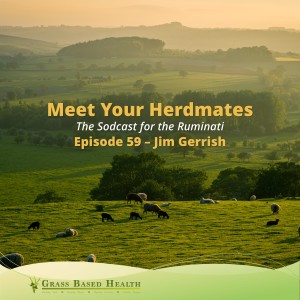
Thursday May 27, 2021
59 Jim Gerrish
Thursday May 27, 2021
Thursday May 27, 2021
"If we are interested in ecosystem function, if we are interested in wildlife diversity, going on a 100% plant-based diet is absolutely the worst choice that anyone can make."
Grazing expert, author, consultant, and speaker
Jim Gerrish is an independent grazing lands consultant providing services to farmers and ranchers on both private and public lands across five continents. Jim received a BS in Agronomy from the University of Illinois and MS in Crop Ecology from University of Kentucky and joined the faculty of the University of Missouri where he conducted beef forage systems research and outreach for 22 years. The University of Missouri-Forage Systems Research Center (FSRC) rose to national prominence as a result of his research leadership. His research encompassed many aspects of plant-soil-animal interactions and provided foundation for many of the basic principles of Management-intensive Grazing (MiG). At the same time, he stayed in touch with the real world on a 260- acre commercial cow-calf and contract grazing operation. In doing so, he took a worn out marginal crop farm and converted it to a highly productive grass farm. After moving to the Pahsimeroi Valley of Idaho, Jim keeps his day-to-day grazing tools sharp through management of a ranch unit consisting of 450 acres of center pivot irrigated pastures, 90 acres of flood ground, and several hundred acres of rangeland.
Jim has authored two books on grazing and ranch management. “Management-intensive Grazing: The Grassroots of Grass Farming” (2004) and “Kick the Hay Habit: A practical guide to year-around grazing” (2010). These and other materials are available at https://www.americangrazinglands.com/collections/books-more. He has written a regular monthly column in The Stockman Grass-Farmer magazine (https://www.stockmangrassfarmer.com/index.php) for over 20 years.
Jim was co-founder of the very popular 3-day grazing management workshop program at FSRC. These schools. Fifteen other states have conducted grazing workshops based on the Missouri model and Jim has taught in eleven of these states. He is an instructor in the University of Idaho’s Lost River Grazing Academy held annually near Salmon ID. He is a frequent speaker at producer-oriented workshops, seminars, and field days around the US and Canada.
Jim was deeply involved in the Green Hills Farm Project (https://www.facebook.com/GreenHillsFarmProject), a grassroots producer group centered in north-central Missouri and emphasizing sustainability of family farms. His research and outreach efforts have been recognized with awards from the American Forage and Grassland Council, Missouri Forage and Grassland Council, National Center for Appropriate Technology, USDA-NRCS, the Soil and Water Conservation Society, Progressive Farmer, and American Agricultural Editors Association.
Call @ 208-588-3900 for information on how to get Jim to your next event or your ranch. https://www.americangrazinglands.com/
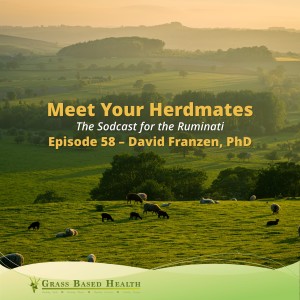
Tuesday May 25, 2021
58 David Franzen, PhD
Tuesday May 25, 2021
Tuesday May 25, 2021
Professor, Extension Soil Specialist, Soil Science Department, North Dakota State University
From Dr. Franzen's University of North Dakota webpage - https://www.ndsu.edu/snrs/people/faculty/dave_franzen/
"Until a few years ago, I was aware of historical loss of topsoil from North Dakota, but I was unaware of the huge scale of losses incurred, and the scale of ongoing losses. A voice-over YouTube PowerPoint presentation is now available for viewing. It is 38 minutes long. In addition, the NDSU Soil Health website has several items on this topic. A strategy to move towards a no-till/strip-till tillage system should be a long-range goal of every producer in this state, and growers that practice these systems should be on the land-rent ‘A-list’ of every landowner in the region. If not, future farmers will be farming subsoil, not topsoil. Some farmers already have this challenge, and know that these fields are the first to suffer from salt damage, soil crusting, poor soil tilth, wetness issues, greater susceptibility to drought and greater nutrient requirements. They might not be aware that these poor soil qualities are the result of historic and often continuing topsoil loss, but they are."
Dr. Franzen's "A History of Phosphate Export/Wind Erosion in North Dakota and the Region" presentation - https://www.youtube.com/watch?v=vQF0hy2crH0
"NDSU Soil Health – Strength from the soil" - https://www.ndsu.edu/soilhealth/
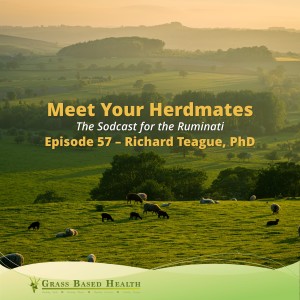
Thursday May 20, 2021
57 Richard Teague, PhD
Thursday May 20, 2021
Thursday May 20, 2021
"Can Soil Health Equal Rancher Wealth? Adaptive multi-paddock (AMP) grazing is regenerating soils, watersheds, critical ecosystem services and livelihoods in North America. Early data shows soil carbon is the essential currency for this vibrancy. We are building on these early results with multi-disciplinary research conducted with regenerative ranchers in different regions of US."
Dr. Richard Teague is a Retired Professor in the Department of Ecosystem Science and Management at Texas A&M University's AgriLife Center at Vernon, Texas. The purpose of his research is to conduct a ranch-scale, multi-county assessment that addresses objectives in the context of improving Soil Health and ecosystem services in grazing ecosystems as the foundation to improving ranch-based livelihoods and as they relate to Climate Change Mitigation and Adaptation. This involves determining: 1) the extent that grazing strategies influence key ecosystem services in the Southern Plains of the USA; and 2) the extent that different grazing management strategies can be used by livestock producers to mitigate and adapt to alternative climate change scenarios.
Carbon Cowboys - https://www.carboncowboys.org/
2015 International Year of Soils (FAO) - http://www.fao.org/soils-2015/en/
https://vernon.tamu.edu/research-project/grazing-ecology-management/
